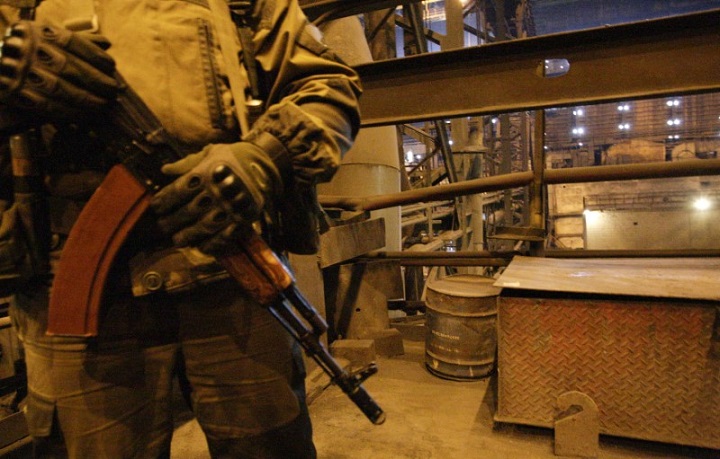Roughly 200,000 phone users in Ukraine‘s rebel-controlled eastern city of Donetsk were cut off from the rest of the country on Wednesday after armed men took over the offices and equipment of the main fixed-line telecoms company, its director said.

Pro-Russian separatists had warned they would seize businesses in areas they control unless the Ukrainian government ends a rail blockade that has halted coal shipments from rebel territory.
The blockade and the rebel retaliation have highlighted the mutual economic dependence between the two sides, despite three years of simmering military conflict in which more than 10,000 people have been killed.
As a result of the takeover of its premises, Ukrtelecom director Mikhail Shuranov said “the company has cut off the Donetsk sector from the national network”.
He said on Facebook: “Around 200,000 of our citizens have lost a means of communication.”
WATCH: Drone footage shows aftermath of shelling in east Ukraine

Separatist leader Alexander Zakharchenko said rebels were following through on their ultimatum because Ukraine had not lifted the blockade.
“Today since midnight companies have been being taken under external control,” separatist website DAN quoted him as saying.
Ukrtelecom is part of a financial and industrial group owned by Ukraine’s richest businessman Rinat Akhmetov, whose power-generating and steelmaking businesses on both sides of the eastern front line have already been hit by the blockade’s squeeze on coal supplies.
On an official visit to Kiev, British Foreign Secretary Boris Johnson joined his Ukrainian counterpart in condemning the separatists’ latest acts.
“This expropriation, like the annexation of Crimea, like other aspects of the behavior that has been encouraged by the Russians, is unacceptable, it must stop,” Johnson said.
Both the Ukrainian authorities and separatist officials have warned of economic fallout from the blockade. Separatists say local industrial firms are suffering, while Ukraine says the country could be hit by rolling blackouts and lost foreign export income of up to $2 billion.
WATCH: Poroshenko, McCain have harsh words for Russia over Ukraine crisis

Russia said the rebels’ move to take control of the companies on its territory was partly understandable because the blockade had put the separatists in “an even more difficult situation”.
“The steps made by the administrations of these regions, … can be understood to a degree,” Kremlin spokesman Dmitry Peskov told journalists.
A humanitarian group funded by Akhmetov that has been a major supplier of aid to conflict-hit areas also said on Wednesday it had been forced to halt operations in rebel-held areas after distribution points were blocked by armed men.
READ MORE: Ukrainian president urges Donald Trump to keep sanctions on Russia
In rebel-held Donetsk, a Reuters witness saw one police car parked near the fund’s distribution center at a football arena. Signs on the building’s doors said the center was not operating and the entrances had been sealed with papers carrying official-looking stamps, but there was no armed presence.
Ukraine’s largest private power and coal producer, DTEK, which is also part of Akhmetov’s business empire, said the management of its operations in separatist-held territory had not been taken over.
It was not immediately clear if or how other Ukraine-registered businesses operating in separatist territory had been affected.
Reporting by Pavel Polityuk and Alessandra Prentice in Kiev, Reuters reporter in Donetsk,; Additional reporting by Aleksandar Vasovic in Moscow; Writing by Alessandra Prentice; Editing by Mark Trevelyan



Comments